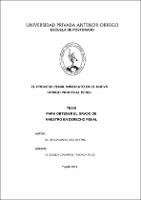| dc.contributor.advisor | Taboada Pilco, Eliseo Giammpol | |
| dc.contributor.author | Diaz Dextre, Ofelia Maria | |
| dc.creator | Diaz Dextre, Ofelia Maria | |
| dc.date.accessioned | 2018-10-15T22:07:45Z | |
| dc.date.available | 2018-10-15T22:07:45Z | |
| dc.date.issued | 2018 | |
| dc.identifier.uri | https://hdl.handle.net/20.500.12759/4399 | |
| dc.description.abstract | La presente tesis titulada: El Proceso Penal Inmediato en el Nuevo Código Procesal Penal,
analiza esta institución jurídica y se plantea el siguiente problema: ¿La aplicación del
Proceso Penal Inmediato afecta el Derecho de Prueba como garantía procesal
constitucional y convencional del Imputado?, y mediante una investigación de tipo
dogmática, teórica descriptiva con la aplicación del método inductivo – deductivo y
aplicando el análisis, la síntesis y el instrumento de la entrevista, se han arribado a
resultados que nos permiten contrastar la hipótesis y arribar a conclusiones, teniendo como
una de ellas, que los operadores del derecho deben aplicar con mucho cuidado, criterio y
fundamento el Proceso Penal Inmediato, pues cuando no se encuadra adecuadamente el
caso dentro de los parámetros establecidos en la norma y aclarados por el Acuerdo Plenario
N° 2-2016/ CIJ -116, afecta significativamente el derecho de prueba del imputado; es por
ello, que existen gran cantidad de incoaciones de procesos inmediatos que se declaran
infundadas y casos en los que son declaradas nulas las sentencias de procesos inmediatos
por afectación a este derecho fundamental, como es el derecho de prueba, otra conclusión
es que para los casos de omisión a la asistencia familiar y conducción en estado de
ebriedad, cada supuesto deberá ser analizado en función a su complejidad y carga
probatoria de las partes a fin de determinar si es de aplicar proceso inmediato o el proceso
ordinario y asimismo, la aplicación de plazos cortos en el proceso inmediato, imposibilitan
una defensa eficaz del acusado, pues los plazos no son razonables y afectan claramente el
derecho de contradicción que es parte del derecho de defensa, pues no permite plantear una
adecuada defensa técnica debidamente sustentada en pruebas de descargo. Se plantean
ciertas recomendaciones a fin de seguir profundizando en el tema materia de investigación
en la presente tesis. | es_PE |
| dc.description.abstract | This thesis entitled: Immediate Criminal Procedure in the New Code of Criminal
Procedure, analyzes this legal institution and poses the following problem: Does the
application of the Immediate Criminal Procedure affect the Right of Evidence as a
constitutional and conventional procedural guarantee of the Imputed?, and through a
dogmatic, descriptive theoretical investigation with the application of the inductive -
deductive method and applying the analysis, the synthesis and the interview instrument,
have arrived at results that allow us to contrast the hypothesis and arrive at conclusions
having as one of them that the operators of the law must apply with great care, criteria and
foundation the immediate criminal process, because when the case is not properly framed
within the parameters established in the norm and clarified by the Plenary Agreement No.
2-2016 / CIJ -116, significantly affects the right of proof of the accused, that is why there
are a lot of initiations of immediate processes that are declared unfounded and cases in
which the judgments of immediate proceedings are declared null and void because of this
fundamental right, such as is the right of proof, another conclusion is that for cases of
omission to family assistance and conduct in case of drunkenness, each case must be
analyzed according to its complexity and evidentiary burden of the parties in order to
determine if it is to apply immediate process or the ordinary process and also, the
application of short deadlines in the immediate process, preclude an effective defense of
the defendant, because the deadlines are not reasonable and clearly affects the right of
contradiction that is part of the right of defense, because it does not allow to raise an
adequate technical defense duly based in exculpatory evidence. Some recommendations
are proposed in order to continue deepening the subject matter of research in this thesis. | en_US |
| dc.description.uri | Tesis | es_PE |
| dc.format | application/pdf | es_PE |
| dc.language.iso | spa | es_PE |
| dc.publisher | Universidad Privada Antenor Orrego | es_PE |
| dc.relation.ispartofseries | T_MAEST.DERE_113 | |
| dc.rights | info:eu-repo/semantics/openAccess | es_PE |
| dc.rights.uri | https://creativecommons.org/licenses/by/4.0/ | es_PE |
| dc.source | Universidad Privada Antenor Orrego | es_PE |
| dc.source | Repositorio Institucional - UPAO | es_PE |
| dc.subject | Proceso penal | es_PE |
| dc.subject | Código Proceso Penal | es_PE |
| dc.title | El proceso penal inmediato en el Nuevo Código Procesal Penal | es_PE |
| dc.type | info:eu-repo/semantics/masterThesis | es_PE |
| thesis.degree.level | Maestría | es_PE |
| thesis.degree.grantor | Universidad Privada Antenor Orrego. Escuela de Postgrado | es_PE |
| thesis.degree.name | Maestro en Derecho con Mención en Derecho Penal | es_PE |
| thesis.degree.discipline | Maestría en Derecho | es_PE |
| dc.subject.ocde | https://purl.org/pe-repo/ocde/ford#5.05.02 | es_PE |
| renati.type | https://purl.org/pe-repo/renati/type#tesis | es_PE |
| renati.level | https://purl.org/pe-repo/renati/level#maestro | es_PE |
| dc.publisher.country | PE | es_PE |


